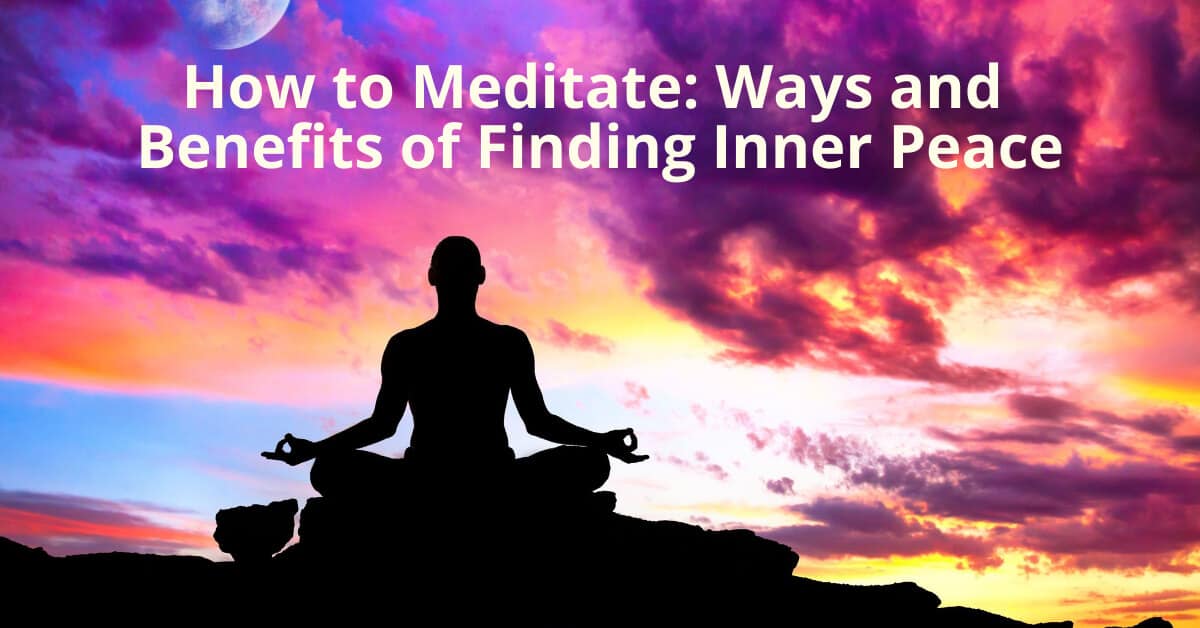Meditation has become very trendy lately. Everyone seems to want to try it out. Some even claim that they can feel more focussed and energized from it. Is it really possible to feel better through meditation?
Meditation is a practice where you focus your attention inwardly. It helps you calm down and relax. It also gives you time to reflect on life and yourself.
Meditation isn’t something new. In fact, it dates back thousands of years. There are various types of meditation, such as mindfulness, transcendental meditation, yoga, etc. The key is to choose the type that suits you.
12 Ways to Meditate
Meditation is an ancient practice that has been used for thousands of years to improve health, happiness, and well-being.
It is one of the most effective stress relievers available. Meditation helps us focus our attention inwardly and relax our bodies and minds.
There are many types of meditation methods, such as mindfulness meditation, yoga, tai chi, qi gong, mantra meditation, and transcendental meditation.
In this article, I share 12 tips to help you learn how to meditate.
1. Find a quiet place where you won’t be disturbed.
2. Sit comfortably in a chair or cross-legged on the floor.
3. Close your eyes and breathe deeply.
4. Focus on your breathing. Notice each breath going into your body and out again.
5. Let go of any thoughts that arise in your mind. Don’t judge them or analyze them. Just let them pass away naturally.
6. Continue focusing on your breathing until you feel relaxed.
7. If you find yourself thinking about something else, gently bring your attention back to your breathing.
8. Repeat steps 1-7 as often as you wish.
9. After practicing meditation regularly, you may want to try guided mediation. Guided meditations are available online or in books or audio recordings.
10. The benefits of meditation include reduced anxiety, depression, pain, insomnia, and stress.
11. Try to do 10 minutes of meditation every day. It’s good for your health.
12. You don’t have to spend hours doing meditation. Start with just 5 minutes a day and work up to longer sessions.
5 Benefits of Meditation
People are turning to meditation as a means of stress relief and relaxation.
There are many benefits associated with meditation, and here are five of the most common ones.
1. Stress Relief
When you meditate regularly, you release tension and anxiety. This helps you feel better about yourself and your life.
It also gives you a sense of calmness and peace. If you’re feeling stressed out, meditating may help you relax and unwind.
The benefits of meditation are endless. It will help you overcome stress, live more peacefully, improve your concentration, increase your productivity, and so
2. Better Sleep
Studies show that people who practice meditation tend to sleep better than those who don’t. They find it easier to fall asleep and stay asleep longer.
This is because meditation reduces stress levels and allows you to focus on relaxing rather than worrying about things.
3. Improved Mood
People who meditate often report feeling happier and calmer. This is especially true after practicing meditation for a period of time.
4. Increased Self Confidence
Many studies suggest that meditation improves self-confidence. It makes you feel more positive about yourself and your abilities.
5. Reduced Anxiety
Research shows that meditation reduces anxiety. It does this by helping you learn to control your thoughts and emotions.
In addition, meditation teaches you to accept what happens without judgment. This helps you live in the moment instead of focusing on the future or dwelling on the past.
So next time you’re feeling anxious, try meditating. You’ll notice a difference in your mood and outlook right away.
Meditation to reduce Stress
Stress is one of those things that everyone has to deal with at some point in life.
It can cause anxiety, depression, insomnia, headaches, stomach aches, backaches, and more.
There are several ways to relieve stress. One of these methods is meditation.
Here are 12 Tips to Reduce stress with meditation
These tips can guide you to get into the meditation state to help lower your anxiety and stress.
1. Find an empty room where you won’t be disturbed
Find a quiet place where you won’t be bothered. This may mean finding a room in your house or apartment that no one else uses.
Make sure there aren’t any distractions nearby such as TV, radio, or children playing.
2. Sit comfortably
Sit down in a comfortable position. Make sure your spine is straight. If possible, sit up against a wall.
Place your hands in your lap.
Close your eyes and breathe deeply.
Take slow deep breaths.
Focus on your breathing.
Breathe in slowly through your nose.
Hold your breath for a moment.
Then exhale slowly through your mouth.
Repeat this cycle until you feel relaxed.
3. Focus on your breathing
Focus on your breathing and try to control your thoughts.
Try to focus on each breath.
When you inhale, think about taking in good air into your body.
Think about the oxygen flowing into your lungs.
As you exhale, think about releasing bad air out of your body.
Think of the carbon dioxide leaving your body.
4. Think positive thoughts
Think about something that makes you happy.
Imagine yourself doing what you want to do.
Picture yourself enjoying whatever it is you’re thinking about.
Think about what you love.
Think about the people you care about.
Think about the future.
Think about anything that brings you joy.
5. Repeat steps 1-4
After you’ve done the first four steps, repeat them again.
Doing this will help you relax even more.
6. Take breaks
Don’t stay in the same spot for too long.
Get up every 20 minutes or so and walk around.
This will help you release tension and calm your mind.
7. Don’t judge yourself
Don’t compare yourself to others.
Don’t say to yourself, “Oh, I’m not doing well.”
Instead, think about how far you’ve come.
Think about how much better you are than you were yesterday.
Think about how far you still need to go.
8. Be patient
Be patient with yourself.
Give yourself time to learn how to meditate.
Remember that it’s okay if you don’t always succeed.
Just keep trying.
9. Keep practicing
Keep practicing.
The more you practice, the easier it will become.
10. Remember why you started
Remember why you decided to begin meditating.
Remind yourself of the reasons why you wanted to start meditating.
Reminding yourself of these reasons will help you continue to meditate.
11. Try different techniques
Try different techniques.
Some people find it helpful to count their breaths.
Others find it helpful to visualize themselves doing what they want to do.
Other people find it helpful to chant mantras.
Whatever technique works for you, just make sure you stick to it.
12. Stay motivated
Stay motivated.
You should never give up on yourself.
Even if you fail to meditate for a short period of time, don’t let this discourage you. It takes time and that time is a longterm investment in yourself to make you feel better, stronger and more focussed.
Conclusion
In conclusion, meditation is a practice that has been around for thousands of years. It’s proven to have many positive effects on both mind and body, including stress reduction, increased happiness, and improved sleep quality. And if you’re like most people, you already spend a lot of time sitting down doing nothing. Why not use that time to improve your mental well-being? Now na! not tomorrow.. Start Today!
























